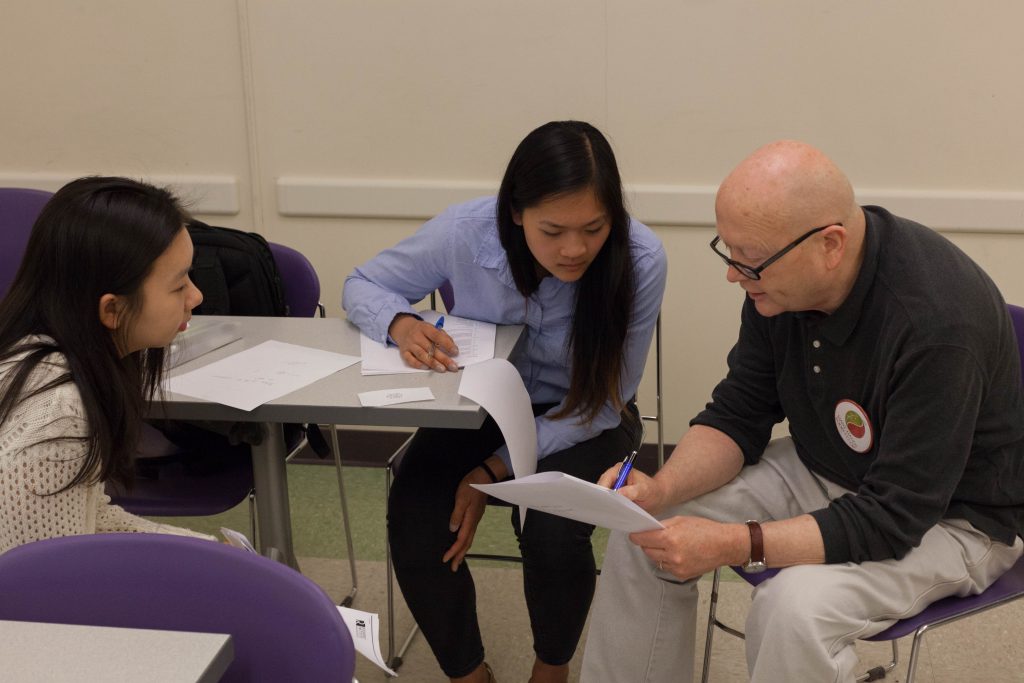
Food insecurity is an issue for many in the Binghamton area, yet few students hear about this problem plaguing their own backyard.
At the Many Hands Against Food Deserts discussion on Wednesday afternoon, Binghamton University students heard from local organizations tackling this problem and learned how food insecurity impacts many individuals throughout the city of Binghamton.
The discussion was led by BU’s Roosevelt Institute, an undergraduate nonpartisan think tank, with the goal of educating students about efforts being made by local organizations to combat food deserts, or regions that lack access to nutritious food.
Generally, food deserts are found in impoverished neighborhoods that struggle to host a full grocery store. Because residents of Binghamton’s North Side lack access to a grocery store within walking distance and residents often subsequently turn to convenience stores and fast-food outlets, the North Side community is considered a food desert.
Eamon Ross, a member of the Roosevelt Institute and a junior majoring in political science, said attendees should get involved in efforts to improve the North Side and stated that integrating students with community members could help improve the area.
“As the University hopes to grow and expand, it is important that these issues get addressed because the well-being of the community should be linked to the well-being of the University,” Ross said. “The idea behind this event is to have interested students look into engaging with different community organizations such as Binghamton Food Rescue, Community Hunger Outreach Warehouse (CHOW), Volunteers Improving Neighborhood Environment (VINES) and the Many Hands Food Cooperative.”
Representatives from each of these organizations were all present at the event and highlighted concerns related to food insecurity. They also discussed how their organizations helped support individuals living in the North Side. David Currie, a partner of the Many Hands Food Co-op, discussed the need for a food cooperative in the area and stated that it could help supply residents of the North Side with proper nutrition sources.
“A cooperative is really, simply an organization that is owned by its members as a way for workers to have access to healthy food,” Currie said. “They’re all over the world, particularly in low-income nations. You all, as students of Binghamton University, have some stake in the community. The community certainly has a stake in you all, whether you believe it or not.”
The Many Hands Food Co-op is an organization that is working to eliminate food deserts in the Binghamton area. Although it is still being established, the cooperative intends to eventually serve as a full-service grocery store as well as a community catalyst for empowerment, redevelopment and education. Currie stated that he felt students should seek to contribute and improve upon the Binghamton area, as they are residents of the community during the four years they are pursuing an education.
“Being part of the community while you are going through your four years at Binghamton is incredibly enriching,” Currie said. “It really has impact on peoples’ lives. This is a project that gives you, the student, the opportunity to really change lives. My guess is that you’ll forever have a piece of your heart in that.”
Max Hersh, a junior in the individualized major program, stated he had no idea that the North Side was considered a food desert, and that he came to the event because he works closely with the Bear Necessities Food Pantry on campus.
“It is a big deal when families and individuals can’t access food,” Hersh said. “To bridge it by coming up with the idea for a food co-op is a brilliant idea. I think there is a lot of potential in this. [Ross’] ideas are well developed, he just needs the support behind him to tell the University about it.”


